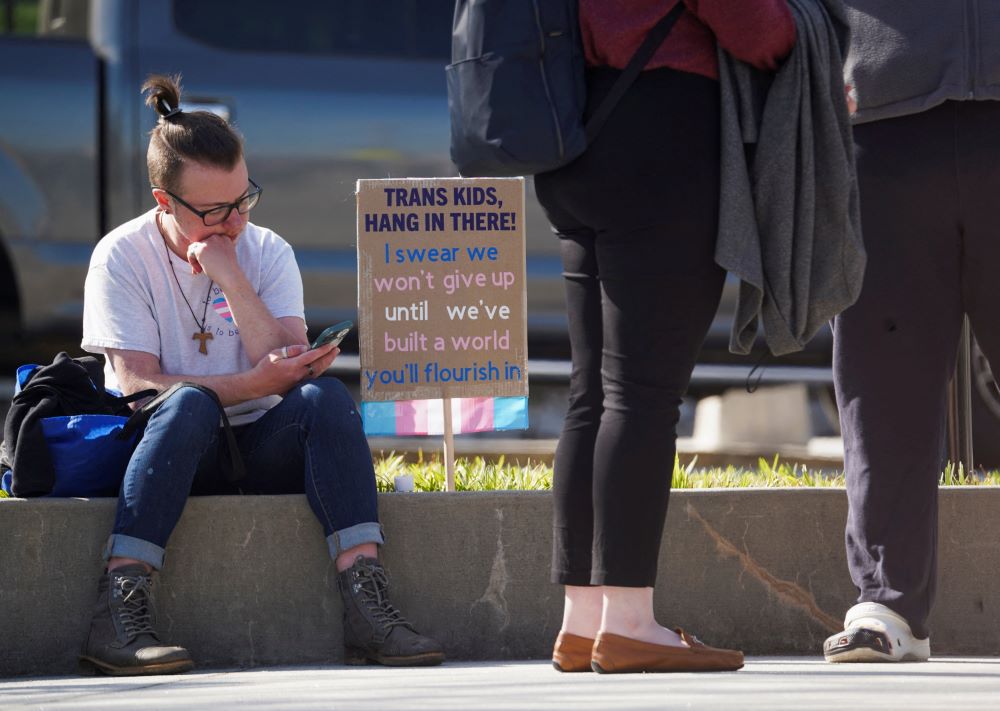
A young demonstrator sits during a protest rally outside the Georgia Capitol in Atlanta March 20, after the state House and Senate voted to prohibit most surgeries and hormone replacement therapies for minors seeking to change their gender. (OSV News/Reuters/Megan Varner)
Once an issue gets dragged into the culture wars, it takes on a certain shape. Memes are advanced by the different sides, competing evidence is invoked, emotional jugulars are identified and pierced. Much of the messaging is driven by the fundraising campaigns of the various interested advocacy groups, and carried over onto competing media outlets. In our polarized society, the issue is forced into the partisan binary, people are told to pick sides, a new battlefront in the culture wars emerges, and the one thing that most characterizes the ensuing fight is the certainty on both sides that they are right absolutely and that their opponents are wrong absolutely. Slogans replace arguments and make wrestling with complex issues almost impossible.
There was a time when wisdom consisted in sailing between Scylla and Charybdis. Now, we are expected to choose one or the other.
Issues and policies related to trangender people have become one of the principal battlefronts in the ongoing culture wars in the U.S. and in the U.S. Catholic Church. Whatever you think about those issues, for purposes of this essay, let's assume everyone has the best of intentions. Except Florida Gov. Ron DeSantis. He seems intent on making malevolence the defining characteristic of his political resume. But, for everybody else, let's assume that those on the right who worry about "gender ideology" and its cultural effect, and those on the left who worry about treating all people with dignity and overcoming the ugly legacy of discrimination against sexual minorities, are all motivated by the best of intentions.
Republican-controlled state legislatures have introduced at least 150 bills this legislative season that seek to limit certain medical treatments for minors, ban trans athletes from participating in some sports and even bar drag shows. This last is especially strange because most drag shows I have been to do not feature transgender people but cross-dressers.
In response, advocacy groups like the Human Rights Campaign have declared a "state of emergency" for LGBTQ+ Americans. President Joe Biden, in his proclamation for National Transgender Day of Visibility denounced the GOP-led efforts and noted that "the Department of Justice is pushing back against extreme laws that seek to ban evidence-based gender-affirming health care."
What left-leaning Americans rarely mention is that gender-affirming care for adolescents is not only being banned in states with GOP-dominated legislatures like Florida or Alabama. In June, the National Health Service of England banned the use of puberty-blocking drugs for children except those involved in clinic trials.
The report from the NHS's Independent Review stated: "The draft interim clinical commissioning policy proposes that puberty suppressing [sic] hormones (GnRH analogues) are 'not routinely commissioned' as there is not enough evidence to support their safety or clinical effectiveness as a routinely available treatment and that they should only be accessed as part of research."
The NHS had previously closed its gender identity clinic, the Tavistock Center, in 2022 and ordered an independent review of all NHS services to transgender young people.
In France, the National Academy of Medicine stated, "a great medical caution must be taken in children and adolescents, given the vulnerability, particularly psychological, of this population and the many undesirable effects, and even serious complications, that some of the available therapies can cause."
In Norway, an independent government health agency has also recommended restricting gender-affirming care. According to this March news report, the Norwegian Healthcare Investigation Board stated, "The knowledge base, especially research-based knowledge for gender-affirming treatment (hormonal and surgical), is deficient and the long-term effects are little known. This is particularly true for the teenage population where the stability of their gender incongruence is also not known."

Judge Amy Clark Meachum addresses the court during a March 11, 2022, hearing in Austin, Texas, on Gov. Greg Abbott's order that parents of transgender children be investigated for child abuse. At least 150 state bills this legislative season have sought to limit certain medical treatments or activities for transgender people. (OSV News/Reuters/Sergio Flores)
These governmental, or quasi-governmental, interventions all stress the acute vulnerability of adolescents, especially those who identify as transgender. That vulnerability extends to those for whose experience of gender dysphoria is transitory as well as to those for whom it will be permanent.
Although it's unclear how many young people's gender dysphoria resolves without long-term or additional medical treatment, this uncertainty itself is reason for caution.
Hannah Barnes, the BBC reporter who exposed the many problems at the Tavistock Center, evidences the necessary empathy even while frankly confronting the problems in this interview at GBNews. There is none of the dismissive nastiness toward transgender individuals that one finds routinely on Fox News or some conservative Catholic websites here in the U.S.
It goes without saying that the medical establishments in these post-Christian countries are not responding to the demands of the religious right. The BBC is not Fox News. Yet health officials in these countries are raising questions about the liberal orthodoxy on the moral necessity of gender-affirming care found in our country.
Nowhere is the emotional argument for gender-affirming care made in a more fraught manner than in the invocations of data that show higher rates of suicide attempts and suicidal ideation among transgender youth than others. As I note above, there is no real debate that adolescence is a phase of human development marked by vulnerabilities and uncertainties. But it is just those uncertainties that both advocates and opponents of gender-affirming care fail to take into account. Treatment should affirm the child in all his or her uniqueness and complexity, not affirm an ideological or political predisposition.
Adults who transition have made the decision with adult certainty and discernment. Adolescents are typically not ready to do this, physically or psychologically. Their feelings of gender dysphoria may be transitory, as are so many aspects of adolescence. Yet in the same commitment to protecting teenagers from harm (in the form of suicide, suicidal thoughts and depression), parts of the medical establishment advocate irreversible harm in other forms, such as some types of hormonal treatments or, in extreme cases, surgery.
The interim report in the U.K also cites the potential for "diagnostic overshadowing." According to the report, "many of the children and young people presenting have complex needs, but once they are identified as having gender-related distress, other important healthcare issues that would normally be managed by local services can sometimes be overlooked."
In other words, the emotional complexities inherent in adolescence are often simplified into a fixed focus on a diagnosis of gender dysphoria before other factors are fully explored. If the source of suicidal ideation is located in a mental health issue other than gender dysphoria, a child might not get the treatment they need from medical personnel if they immediately advocate gender-affirming treatment for anyone who self-identifies as experiencing gender dysphoria. This appears to be one reason the Tavistock Center in London was shut down.
In an interview on Andrew Sullivan's "Dishcast," the BBC's Barnes discussed her reporting on the Tavistock Center and she voiced concerns about the narrative linking suicide rates with the denial of gender-affirming care. She acknowledged that "any death of a young person in those circumstances is one too many and it's awful." But the data is too cloudy, the reasons adolescents contemplate or attempt suicide so various, and the potential for diagnostic overshadowing so worrisome, any clear-cut linkage "does not appear to be borne out by the data," Barnes said.
Here in the U.S., the American Psychological Association continues to assert that "supportive evidence-based interventions — including but not limited to mental health counseling, social transition support, and hormone therapies — greatly improve mental health outcomes for transgender youth."
However, the American Academy of Pediatrics, while upholding its support for treating adolescents for now, says it "plans to review the evidence for gender-affirming medical care and potentially amend its policies that help guide doctors and clinicians providing the treatment to transgender youth,” according to a recent report in the Wall Street Journal. The group plans to further study the safety and efficacy of puberty-blockers in adolescents.
Advertisement
One thing is clear in all of this: No one should use such delicate and nuanced issues rhetorically to accuse anyone of having blood on their hands. It turns out the rates for all teenagers are shocking. I hope we can all agree that our nation needs to do a much better job addressing the mental health crisis affecting so many of our young people.
My takeaway from reading about the different discussions happening in some European countries from those happening here in the U.S. is that there is a lot of scientific work to be done, and a lot of dialogue between scientists, clinicians, ethicists and with both those who identify as transgender in adulthood and those who questioned their gender identity in adolescence but no longer report gender incongruence. In layman's terms, it was an adolescent phase.
Morally, my reading leads me to conclude with two old-fashioned moral lessons, one for each side in the debate.
To my friends on the political and cultural right, I would remind them that if the science proves them to be correct about the need to limit or at least go slow regarding gender-affirming care, there are few things more morally repugnant than the right thing done for the wrong reasons. And, to my friends on the left, let us remember that we can, with the best of intentions, do something that proves objectively wrong, and we know what road is paved with good intentions.
To everyone, and especially to Catholic dioceses figuring out how to deal with this issue in schools or hospitals or other ministries, it is imperative to remember that when discussing adolescents, we are talking about vulnerable, changing and changeable, impressionable and determined children. If I have reached any certainty in this debate, it is that there is no place for cookie-cutter, one-size-fits-all policies, that each child must be considered in his or her own integrity and individuality. Guidelines, yes. Predetermined policies, no. And let's all show some patience and understanding with each other.







